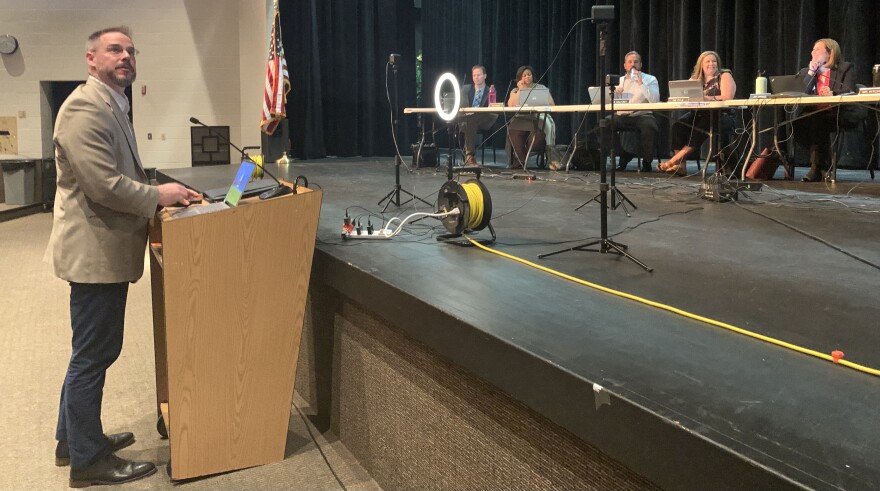The Unit 5 school board expects to vote next month on whether to join a collaborative effort to create a standardized economic incentive package for a local enterprise zone.
Patrick Hoban, who leads the Bloomington-Normal Economic Development Council, spoke during Wednesday's school board meeting. He said simplifying the baseline offers to companies would better attract businesses to the zone, which targets harder-to-develop pockets across a 15-square-mile area, he said.
Also at Wednesday's meeting, the board heard an update on the fiscal 2022 budget, and held a moment of silence to honor the 19 grade school students and two adults killed in Tuesday's mass shooting in Uvalde, Texas.
"What happened was horrific and unfortunately occurs way too often in the United States," said Superintendent Kristen Weikle.
Enterprise zone proposal
Hoban introduced the enterprise zone proposal at the school board’s May 11 meeting, but returned Wednesday to answer questions about the incentive basics, and present more details on the Bloomington-Normal-McLean County Enterprise Zone.
The board plans a June 15 vote.
The key point of a standardized package is to streamline the process, and show potential developers easily what they'd be offered to locate in the zone, he said. It comes down to marketing, and generating tax revenue that doesn't currently exist, he said.
"The target areas are the harder-to-develop areas," said Hoban.
Under the proposal, sliding scale abatements would decrease over a number of years.
Wooing businesses to a community is a highly-competitive process, he said, mentioning the Twin Cities recent failed attempt to bring a Samsung battery manufacturing plant to the area.
"It’s becoming more and more difficult to land deals,” Hoban said, noting Samsung opting for a Kokomo, Ind., site.
If the standardized incentives proposal becomes a reality, Hoban said the EDC will publish an economic impact online dashboard, related to projects in the enterprise zone.
Board member Jeremy DeHaai said standardizing means "having a plan in place, so that you can just have it ready to present, as opposed to having to herd the cats — with five different taxing bodies."
DeHaai joined board members Alan Kalitzky and Stan Gozur in sharing concerns that community members sometimes have misconceptions about economic incentives.
Sometimes such tax breaks are seen as simply giving the district’s money away, said DeHaai. So, he likes the EDC's concept of making an online dashboard about the enterprise zone.
"So when somebody says, 'Hey why did you give all this money to Rivian (Automotive) to move to town?' We can say 'We'll we didn't give them the money: Look what's coming,'" said DeHaai, alluding to the expected tax revenue from that project in the years ahead.
The dashboard can show that long-term financial benefit for the district, he added.
FY22 budget saved by working cash funds
Amending the annual budget as a fiscal year nears its end is a step Unit 5 takes each year, said Marty Hickman, Unit 5's finance director.
"It just gives us a chance to talk about where we're really going to land compared to the road map we had laid out last fall," he said.
The budget had called for moving $12.5 million of working cash bonds to the district's education fund. However, because revenue came in slightly higher than projected, only $11 million was moved, said Hickman.
It's good news the district saw a slight uptick in property tax revenue, that federal COVID-relief funds arrived, and that state transportation funding was better than expected. But board members Alan Kalitzky and Amy Roser said it's important to remember the district remains in dire straits financially.
"They are still drops in a relatively large bucket," said Kalitzky. Just because the administration was conservative in revenue projections, that doesn't mean the district should have a false sense of security, he said.
The board's decision to issue working cash bonds really held the budget in line, said Roser. Without that, the district still would have had a roughly $11 million deficit.
Hickman said using working cash bonds isn't the best way to resolve the deficit — because of associated expenses and interest rates.
"It's always a short-term fix," he said.
Board urges feedback on finances
On Wednesday, Weikle updated the board on the district's six-month community engagement process. The project's goal is to collect feedback about how to best address the multimillion-dollar deficit.
A Phase 2 online survey and a phone survey will be available through Saturday, said Weikle. She said project consultants are calling community members, but people also may proactively call instead. The district website has the information, as well as links to online presentations about the project.
Several board members urged community members to join in the public engagement process.
Board member Amy Roser said she’s appreciated the diversity of feedback but she's been disappointed by the amount of feedback. She challenged people who crowded into a school board meeting rallying for music program funding this spring, to now step forward and take part.
"We really need feedback, and we really need perspective in order for this process to represent what you want for your schools in Unit 5," she said.
In other business, the board:
- Moved forward with a project to improve security at Oakdale Elementary School. Wednesday’s vote awards a $41,000 contract to Normal-based J. Spencer Construction for the project's first phase.
- Voted to abate 2021 property taxes for Rivian Automotive and Brandt Properties USA. The abatements are part of multiyear development agreements.
- Updated its health education and sex education programs to reflect current state requirements. Weikle noted parents can opt-out their students for either program, though most families do not.
- Renewed its contract with Embrace Database Solutions, for Individualized Education Plans and Medicaid provider related software.


